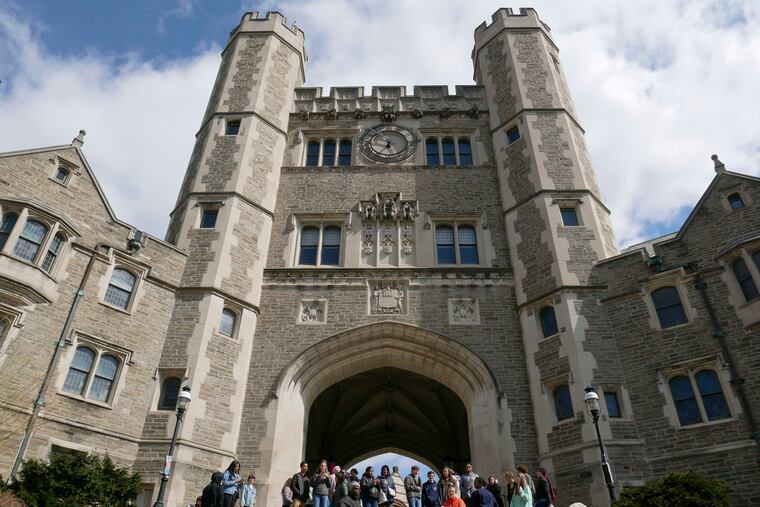Princeton board fires professor in sexual misconduct investigation
Tenured professor Joshua Katz failed to fully cooperate with a sexual misconduct investigation that his supporters say is retaliation for his viewpoints.

Princeton University’s board of trustees voted Monday to fire Joshua Katz, a tenured professor in the classics department, for failing to fully cooperate with a sexual-misconduct investigation that his supporters say is retaliation for his viewpoints.
Katz sparked controversy for a 2020 essay opposing faculty proposals to combat racism at the university after the murder of George Floyd. The backlash against his piece vaulted him to star status among some conservatives who viewed the reaction as an attack on free speech. Amid the attention, allegations of Katz, 52, having an improper relationship with a female student resurfaced, leading to a university investigation that has now led to his dismissal.
The board sided with Princeton President Christopher L. Eisgruber and faculty dean Gene A. Jarrett, who both recommended Katz be terminated for withholding information in a 2018 investigation into his relationship with an undergraduate student a decade earlier.
Katz did not immediately respond to requests for comment on Monday. His attorney, Samantha Harris, declined to say whether Katz is will take legal action but said he is keeping all of his options open.
"Princeton is going to say this had nothing to do with his political speech and this was a completely new investigation," Harris said. "But I don't think there is a person out there who genuinely doubts that if Professor Katz had not published his article in 2020 that he would be employed by Princeton."
Katz had previously admitted to having a consensual sexual relationship with the student, who did not participate in the original 2018 investigation. He was suspended without pay for a year for violating school policy banning sexual relationships between faculty and students, and placed on three years' probation.
The relationship drew new scrutiny in February 2021 after the student newspaper, the Daily Princetonian, wrote about it as part of a lengthy investigation of sexual harassment accusations against Katz. Later that month, the former student filed a complaint with the university that spawned another investigation.
According to Princeton, the former student provided new information unknown to the university in 2018. Investigators allege that Katz discouraged her from participating and cooperating in the original probe after she shared with him that she would. They also allege that Katz discouraged the student from seeking counseling through the university health services to allegedly prevent the university from learning about his conduct.
"These actions were not only egregious violations of University policy, but also entirely inconsistent with his obligations as a member of the faculty," Princeton wrote in a statement issued Monday.
Harris, Katz's attorney, said the university's actions could have a chilling effect on free speech on college campuses.
"The message to other people who might want to speak out is the price is having your personal life turned inside-out looking for information to destroy you," Harris said. This is "someone who was previously an award-winning, highly respected professor, but from the moment he published that article onward he became a relentless target until he was fired."
Jarrett, the faculty dean, pushed back against the assertion that Katz's views were the catalyst for the investigation in a November report on the probe, saying "the current political climate of the university, whether perceived or real, is not germane to the case."
Katz stirred up tensions on campus after a group of faculty, students and graduates signed an open letter in July 2020 demanding Princeton atone for the legacy of racism on campus by addressing bias in hiring and admissions. Katz penned an essay days later saying the letter was an embarrassment to the faculty who signed it and arguing that their demands "would lead to civil war on campus."
He also criticized a now-defunct student group, the Black Justice League, that advocated for the removal of former president Woodrow Wilson's name from a campus building. Katz called the group "a small local terrorist organization."
Eisgruber criticized Katz's characterization of the student organization as "irresponsible and offensive" but asserted the professor's views "can be answered but not censored or sanctioned."
On Saturday, Eisgruber reiterated his commitment to freedom of speech before an audience of graduates at an event on the Princeton campus. While Eisgruber declined to discuss Katz's case, he stressed that Princeton faculty must treat students appropriately and be honest.
“We take those rules very seriously here and we believe that a faculty member is bound by those obligations, regardless of how distinguished they may be, and regardless of what their political views may be,” Eisgruber said. “Political views aren’t a reason to investigate anybody. They’re also not a defense for investigating anybody.”